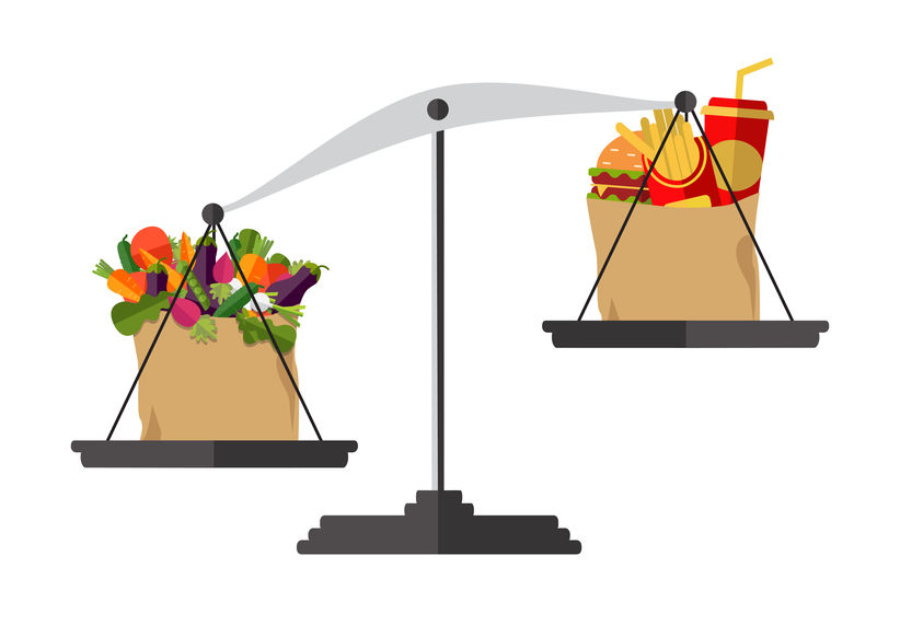We’ve all heard it before, “everything in moderation” or “eat a balanced diet”, but what does that mean and what does that mean for you? In this article we are going to explore how to create balance in your diet, first through observation and then by considering your own personal needs and relationship to food.
Observation & Awareness
As a team of Nutritionists and Functional Medicine Practitioners, we have come to appreciate more and more the power of observation & awareness.
Observation and bringing awareness to one’s diet and choices is probably the first step in creating change, particularly if looking to make long term changes to one’s nutrition and relationship to food and not just embarking on another short-term diet.
When observing your own diet it is important that it is done on a non-judgmental fashion. You are simply looking at your current food choices and understanding circumstances, environments, emotions and specific triggers that might result in specific behaviours when it comes to food and drink.
By simply observing you will start to see the connections between emotions and circumstances with food choices. Given that food choice is as much driven by emotion, as it is the knowledge of what to do, it is crucial that we account for this when looking at the choices we make.
Introducing a food, symptoms and emotions diary
For those looking to make long-term changes to their nutrition, lifestyle and health we will observe their food habits, often using a food, symptoms and emotions diary.
This gives our clients an opportunity to see:
- What they eat
- What symptoms they are experiencing and how that might be connected to food choices or emotions
- What emotions and circumstances contribute to certain nutrition and lifestyle habits
Check out the link below where you can download a food, symptoms and emotions diary template:
With awareness comes change
When using a food, symptoms and emotions diary I then ask my clients to review the diary themselves, picking out areas of interest and areas that they would like to focus on.
Observing and increasing self-awareness increases the motivation for change. When we see something ourselves and we understand more why we have certain behaviour patterns we are more likely to change them. I find it much more powerful from a behaviour change point of view than simply telling someone what to do based upon no observation or only my observation.
Our clients tend to have good knowledge about what food to eat, albeit sometimes confused about what to do or lacking in confidence about the changes to make.
If you are able to pick up on specific emotions or circumstances that trigger off food patterns that are non supportive of your goals, then it is these areas that we must focus on.
Common areas of consideration are:
- Nutrition habits due to emotions such as feeling lonely, sad, upset, angry, bored, stressed etc.
- Nutrition habits in certain social environments or peers.
- Nutrition habits when travelling with work or as part of work entertainment.
- Nutrition habits associated to sleep health, jet lag etc.
- Nutrition habits associated to exercise demands.
- Nutrition habits associated to physical symptoms.
As you start to pick up on areas such as those listed above you can then start to incorporate specific strategies to help in those situations.
Likewise if your nutrition is being continually derailed by certain stressors/emotions then considering addressing these areas as a priority before even considering following yet another short-term diet plan is probably a good idea. For some this may mean working with someone to support them on an emotional/psychological standpoint. Our nutritionists having training in this area and we also have associate clinicians that we work with who offer mindfulness therapy, clinical hypnotherapy and life coaching. Why not check out our core team of nutritionists as well.
You can see just from this how making change to your diet is much more than just knowing what to eat, it’s understanding why we choose to eat in certain ways. This is why we look at the following areas when considering changing one’s nutrition:
- Why you eat
- When you eat
- How you eat
- What you eat
Finding Balance
The next big questions is how do I find balance and what is the right balance for me?
Eating a balanced diet is unique to everyone. It is specific to your own circumstances, current health, health history, symptoms and goals.
You must always find balance between:
- The physiological role of nutrition – how nutrition affects the body, eating to ensure health and performance.
- The psychological role of nutrition – taste, emotions, enjoyment etc.
- The social role of nutrition – how nutrition plays a role for you in social situations
Becoming imbalanced in any of these areas leads to a poor relationship with food.
We see many people these days with high levels anxiety from constantly thinking about the physiological impact of food on their body as people with health issues because of a much more flexible approach to eating based upon taste and convenience alone.
If you have specific health or physique goals then chances are you are going to need to focus more on the physiological impact of food. Some people can still have a good amount of flexibility even with those goals; hence for most people it is not about removing foods and complete restriction, it is more about figuring out how often you can be more flexible with your diet.
Of course there are certain populations that have to completely remove certain foods for the sake of their health, consider those with celiac disease. The exposure to gluten and the impact on their health significantly outweighs any potential social or psychological benefit they may have from eating a piece of bread, so it makes perfect sense that gluten is removed from their diet 100% of the time.
If you are going to use the food, symptoms and emotions diary note on each meal whether it was a meal designed to serve you from a physiological perspective, social or psychological. After a week, see what your balance is.
Bank Account Analogy
When it comes to flexibility with food, you can use a bank account analogy. Eating lots of health supporting foods is like depositing money into your bank account. The longer you deposit money in the easier it is to make a withdrawal without it having any negative impact on your health. If you are being very flexible with your food choices then eventually you go into debt and over time this has a negative impact on how you feel, look and function.
Everyone’s withdrawals will be different depending on how they react to the nutrition choices they intend to be flexible with. For one person a piece of bread will cause no issues at all, while for another person it causes a cascade of immune and inflammatory responses that mean it is a more significant withdrawal for them.
Can’t you just write me a diet plan to follow?
If you bought a car would you allow the car sales person to tell you what car you were going to have, what colour it was going to be and what the optional extras you are going to have or would you want to be involved in the decision making process as well?
Creating a sustainable nutrition plan is a partnership. It involves you observing your relationship to food, your choices, knowing with clarity your goals and then being guided rather than being told what to do.
Creating structure is certainly not a problem and having a plan to follow is also completely fine, but the creation of that plan may take time and needs to be flexible as goals and circumstances change. If you have a rigid plan to follow as soon as any change in circumstance comes up, your ability to follow that plan may become compromised. Not to mention following one very specific diet is also extremely boring over time, and very few people have that relationship to food that allows them to just see food as function and nothing else.
You need to build in fluidity and flexibility with your diet, this will provide you with a more sustainable and enjoyable approach to your nutrition, lifestyle and health.
If you are looking for help with your nutrition, please feel free to complete the enquiry form below or check out our team of Nutritionists and Functional Medicine practitioners to understand more about our approach.
Contact Steve Grant Health
To learn more out how Steve Grant Health can assist you on your journey, please fill out the enquiry form below.
Please note that depending on your specific circumstances and goals, Steve may recommend that you work with one of the specialist practitioners within his network of trusted professionals.
If you have been referred by a clinician, please complete the form and ensure that you state who has referred you or have your practitioner email Steve direct to make a referral that way.
Click the button below to open the client enquiry form:
[widgetkit id=”643″]




